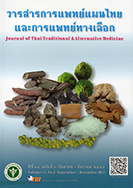Antibacterial Activity Against Bacillus cereus of Lupinifolin from the Stem of Derris reticulata Craib.
Main Article Content
Abstract
Bacillus cereus is the bacterium commonly causes food poisoning in human. The contamination of Bacillus cereus in food has been found at a high rate. This study aimed to investigate the antibacterial effects of lupinifolin, a bioactive compound extracted from Derris reticulata against this pathogen. Lupinifolin showed the inhibitory effect in B.cereus growth both on MHB agar cultured-bacteria and Disc diffusion method different from ampicillin (p < 0.05). Furthermore, Microdilution method showed MIC and MBC of the pure compound were 8 and 16 µg/ml, respectively. Under electron microscope, lupinifolin was found to be capable of destroying cell wall and swelling cell membrane of Bacillus cereus. In conclusion, the present results suggests that lupinifolin might exert its anti-B.cereus activity by altering the normal functions of cell wall and cell membrane.Thus, lupinifolin could be a potential compound for the development of antibacterial drugs in the future.
Article Details
References
2. Mahidol CH, Prawat H, Ruchirawat S, Lihkitwitayawuid K, Lin L-Z, Cordell GA. Prenylated flavanones from Derris reticulata. Phytochemisty. 1997;45(4):825-9.
3. Cushnie TP, Lamb AJ. Antimicrobial activity of flavonoids. Int J Antimicrob Agents 2005;26(5):343-56.
4. Kumkrai P, Kamonwannasit S, Chudapongse N. Cytoprotective and anti-diabetic effects of Derris reticulata aqueous extract. J Physiol Biochem. 2014;70(3):675-84.
5. Wisetsutthichai S, Techamahamaneerat S, Junyaprasert V, Soonthornchareonnon N. Gel preparation development from Derris reticulata Craib. extract as an anti-herpes simplex drug. Thai Journal of Phytophamacy. 2005;12:11-22. (in Thai)
6. Clinical and Laboratory Standards Institute. Methods for Dilution Antimicrobial Susceptibility Tests for Bacteria That Grow Aerobically, Approved Standard. Clinical and Laboratory Standards Institute document M07-A8. 2012;16-8.
7. Joycharat N, Thammavong S, Limsuwan S, Homlaead S, Voravuthikunchai SP, Yingyongnarongkul BE, et al. Antibacterial substances from Albizia myriophylla wood against cariogenic Streptococcus mutans. Arch Pharm Res. 2013;36(6):723-30.
8. Ghosh S, Indukuri K, Bondalapati S, Saikia AK, Rangan L. Unveiling the mode of action of antibacterial labdane diterpenes from Alpinia nigra (Gaertn.) B. L. Burtt seeds. Eur J Med Chem. 2013;66:101-5.
9. Soonthornchareonnon N, Ubonopas L, Kaewsuwan S, Wuttiudomlert M. Lupinifolin, a bioactive flavanone from Myriopteron extensum (Wight) K. Schum. stem. Thai Journal of Phytophamacy. 2004;11(2):19-27.
10. Panda SK. Screening methods in the study of antimicrobial properties of medicinal plants. Int J Biotech and Res. 2012;1-35.
11. Prasad SK, Laloo D, Kumar M, Hemalatha S. Antidiarrhoeal evaluation of root extract, its bioactive fraction, and lupinifolin isolated from Eriosema chinense. Planta med. 2013;79(17):1620-7.
12. Joycharat N, Boonma C, Thammavong S, Yingyongnarongkul BE, Limsuwan S, Voravuthikunchai SP. Chemical constituents and biological activities of Albizia myriophylla wood. Pharm Biol. 2016; 54(1):62-73.
13. Chansuwan S, Palanuvej CH, Ruangrungsi N. Pharmacognostic Specification and Lupinifolin Content of Derris reticulata stem Wood. Conference proceedings the 8th Thailand-Japan International Academic Conference 2016.
14. Ananchaipattana C, Hosotani Y, Kawasaki S, Pongsawat S, Latiful BM, Isobe S, Inatsu Y. Prevalence of foodborne pathogens in retailed foods in Thailand. Foodborne Pathog Dis. 2012;9(9):835-40.
15. Yusook K, Weeranantanapan O, Hua Y, Kumkrai P, Chudapongse N. Lupinifolin from Derris reticulata possesses bactericidal activity on Staphylococcus aureus by disrupting bacterial cell membrane. J Nat Med. 2017;(71):357-66.


